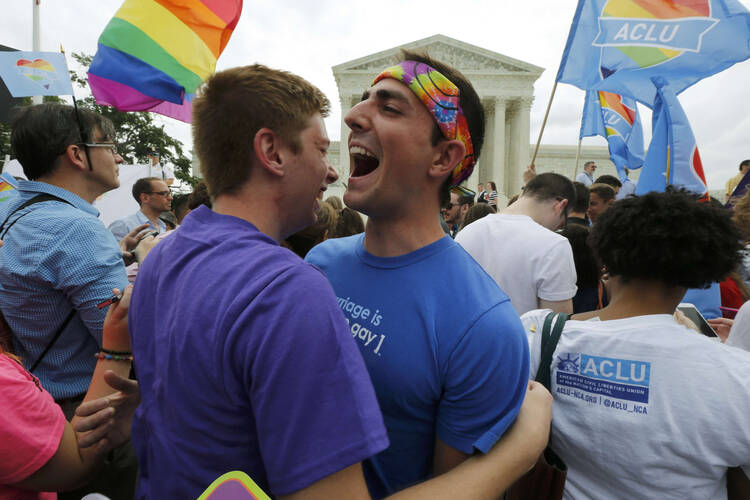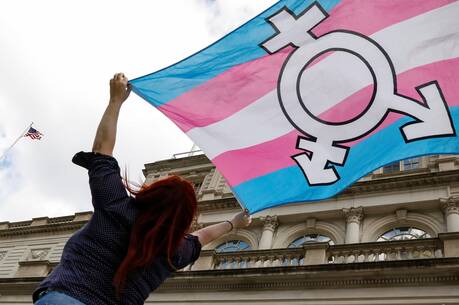In his dissent from the Supreme Court decision legalizing same-sex marriage in all 50 states, Chief Justice John Roberts suggested that any marriage made possible by the case of Obergefell v. Hodges will be forever tainted by an asterisk indicating judicial activism.
“However heartened the proponents of same-sex marriage might be on this day,” he wrote, “it is worth acknowledging what they have lost, and lost forever: the opportunity to win the true acceptance that comes from persuading their fellow citizens of the justice of their cause.” That the victory came through the court rather than the legislative process, he warned, “will for many cast a cloud over same-sex marriage, making a dramatic change that much more difficult to accept.”
This prediction is not supported in Massachusetts. After same-sex marriage was legalized in 2004 by that state’s supreme court, popular opinion swung heavily against the decision, with 71 percent saying the issue should be decided by popular referendum, and it seemed inevitable the state legislature would advance a constitutional amendment banning gay marriage.
But once the marriages actually took place, opposition dissolved both among voters and legislators. A few years later, it was essentially impossible to win an election in Massachusetts if you refused to accept the “dramatic change” brought about by the court. The citizenry did not want to reopen a debate about whose lives were worthy of “dignity” (to use a favorite word of Justice Anthony Kennedy, author of the same-sex marriage decision), or to revoke civil rights from people who were friends, co-workers and family members.
Among the American public, wide acceptance of Supreme Court decisions mandating the integration of public schools and striking down bans on interracial marriage took decades (far longer than acceptance of same-sex marriage), but it would be naïve to argue that public opinion would have evolved faster without the court’s intervention. It also strains credulity to argue that Americans would be more supportive of minority religious rights if the Supreme Court hadn’t meddled with the democratic process in 1943 by ruling that local governments could not force Jehovah’s Witnesses to pledge allegiance to the flag.
Roe v. Wade may be an exception to the rule, in that the Supreme Court decision preventing restrictions on abortions in the first trimester has not led the way for a significant shift in public opinion. But nothing in Obergefell v. Hodges is comparable to the arbitrary nature of the first-trimester standard. Other Supreme Court decisions have been grounded in social science data, such as the corrosive effects of racial segregation in a society, while there has been no corresponding consensus on abortion. (The question of when life begins resists quantification.) In contrast, most social scientists now believe that sexual orientation is immutable and that “conversion therapy” is ineffective and harmful. As a result, opposition to same-sex marriage is rapidly shrinking to correspond with the number of people who believe that Leviticus 18 takes precedence over the Constitution in American civil law. This change in public sentiment is not going to reverse because Ruth Bader Ginsberg decided there was no justification in further delaying the legal recognition of same-sex couples.
At any rate, Justice Roberts may be behind the curve in his objections to the court’s majority decision. Some opponents are now advancing a “we were here first” argument that their definition of marriage should prevail even if most Americans disagree. Presidential candidate Bobby Jindal accused the court of “conveniently” following “public opinion polls,” and fellow candidate Mike Huckabee told a political gathering the court had defied “the laws of nature’s God,” a view that seems immune to the kind of grass-roots politicking that Roberts suggested was a better path for gay rights activists.
Huckabee and others assert that the right of a gay couple to legal benefits, and the right of a church to marry such a couple should it choose to, must be trumped by the right of a florist or baker not to deal with customers of different faiths. “Are we going to trade one level of what’s called discrimination for a new level of discrimination against people of faith?” Huckabee asked ABC News. This argument for “grandfathering” bias against gay and lesbian people into American civil law is small-minded and uncharitable (“discrimination” for his side, “what’s called discrimination” for the other) is now under a cloud, and history suggests that it will stay there.








